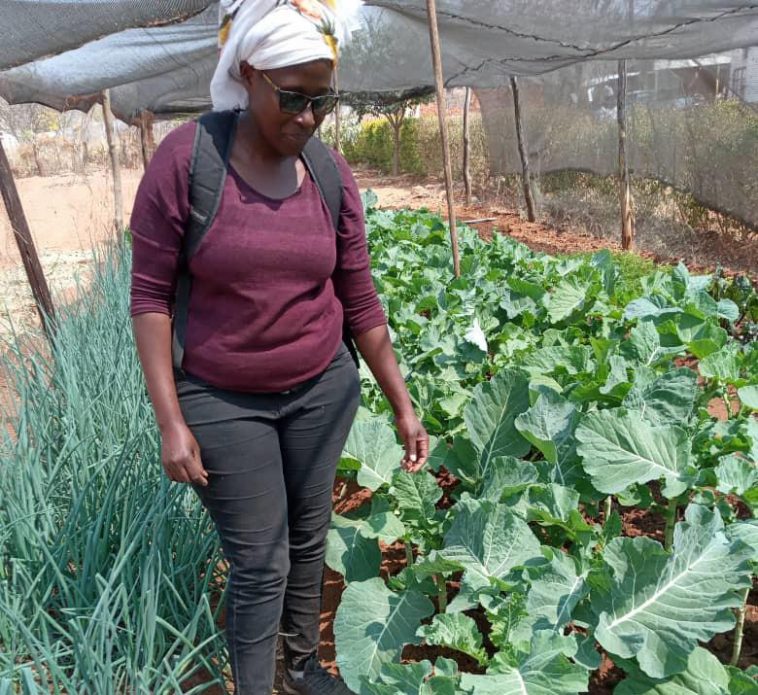Intellectual knowledge blended with practical experience is always a well-balanced combination in any profession. In a sector such as agriculture, the value such an individual brings on the ground is indispensable.
Hughna Dlodlo is one such expert. Her contribution as an agronomist to vegetable and fruit production, which constitutes over 60% of Zimbabwe’s agricultural production systems, is invaluable.
She started her career working in the Department of Agriculture as an Extension Officer for five years, then moved into the private sector beginning with PANNAR Seeds. She did some private consultancy before joining Total Farm Solutions for a period of three years and then ventured out on her own again where she has become a sought-after private consultant.
Her interest in agriculture stems from the thrill she obtains from seeing a project grow from its initiation as it is nurtured to success. She says challenges keep her on her toes. “Challenges can be frustrating, but it allows me to grow as I have to find solutions to the various challenges.”
The idea to venture into consultancy came after realising that most farmers lack the technical knowledge to run their enterprises commercially. The downside of consultancy is that most of the landowners are first generation commercial farmers lacking an appreciation for the services from the agricultural consultancy sector and can thus be reluctant to hire a consultant or pay for his/her services.

Hughna Dlodlo doing her magic as private consultant in a tomato tunnel.
As the agricultural sector is an ever evolving industry, she has to keep up with the challenges and industry developments. She does this through liaisons with other players in the industry about new developments in crop varieties, pests, pesticides and fungicides. A lot of institutions offer free online courses on different subjects and she does her best to attend at least two different courses each month.
Information technology has helped her operate more efficiently as her services have an increased coverage thanks to a lot of people using online services. Problem solving on farms is also simpler. “I do not always have to be on-site to assess problems and propose solutions,” says Hughna
Agricultural bodies and institutions have been immensely helpful in her career. The efforts of organisations such as the Zimbabwe Commercial Farmers Union (ZCFU), the Commercial Farmers Union (CFU), the Agricultural Marketing Authority (AMA), and Zimbabwe Trade (ZimTrade) among others have helped her with information which expanded the consultancy’s product and service range, thereby increasing her client base.
One of the challenges she faces is the unstable economy as most small-scale farmers are more focused on survival rather than investing in growth. Another challenge is that some farm managers do not always fully follow agronomic recommendations and farm recording procedures as they sometimes have no one to report to.
The adverse effects of drought, flooding and extreme high and low temperatures have also seen some farmers lose their crops making them reluctant to invest in agricultural projects. At times the lack of practical experience of some industry experts makes it hard to find individuals to partner with on some of her projects. Any partner has to be screened thoroughly to ensure the quality of services.

To assess pests and diseases you need to get down to it.
To face these challenges Hughna has had to adapt quickly and in some cases lower her service charges to still attract low earning clients.
On the upside more professionals and expatriates are now turning to agriculture to supplement their income and as a retirement option. They understand the value of expertise. The government is also expanding programmes aimed at increasing agricultural production.
Most of Hughna’s farming work include a work plan and weekly report that makes the farm staff more accountable and ensures that her advice is followed.
Through the use of the internet and mobile applications, she ensures that she is aware of climatic changes that may affect crop production, and if she finds that crops may be affected she ensures that she relays precautionary measures to be put in place.

Leaves tell a story and you can trust The Crop Whisperer to understand the language of plants.
She intends to maintain the high quality of products and services she offers, increase her staff, engage more with other regional and international people, attend more workshops and training opportunities, and reinvest into her own production system.
Hughna says: “Zimbabwe has so much to offer and we must heep up the hope that better days are yet to come and a greener future awaits farmers.”









